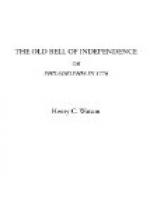“‘Come out and meet your enemy like a man!’ exclaimed Humphries, ’and don’t crawl, like a snake, into a hollow tree, and wait for his heel. Come out, you skunk! You shall have fair fight, and your own distance. It shall be the quickest fire that shall make the difference of chances between us. Come out, if you’re a man!’ Thus he raved at him; but a fiendish laugh was the only answer he got. He next tried to cut his legs with his knife, by piercing the bark; but a bend of the tree, on which Blonay rested, prevented him. He then selected from some fallen limbs one of the largest, which he carried to the tree and thrust into the hollow, trying to wedge it between the inner knobs on which the feet of the half-breed evidently were placed. But Blonay soon became aware of his design, and opposed it with a desperate effort. Baffled for a long time by his enemy, Humphries became enraged, and, seizing upon a jagged knot of light wood, he thrust it against one of the legs of Blonay. Using another heavy knot as a mallet, he drove the wedge forward against the yielding flesh, which became awfully torn and lacerated by the sharp edges of the wood. Under the severe pain, the feet were drawn up, and Humphries was suffered to proceed with his original design. The poor wretch, thus doomed to be buried alive, was now willing to come to any terms, and agreed to accept the offer to fight; but Humphries refused him, exclaiming, ’No, you don’t, you cowardly skunk! you shall die in your hole, like a varmint as you are; and the tree which has been your house shall be your coffin. There you shall stay, if hard chunks and solid wood can keep you, until your yellow flesh rots away from your bones. You shall stay there until the lightning rips open your coffin, or the autumn winds tumble you into the swamp.’ So saying, he left him, and went back to the camp—left him to die in the old woods, where no help could ever come; and in this wild and awful manner—buried alive—perished the savage half-breed.”
“That was an awful death, indeed,” exclaimed Mrs. Harmar. “That Humphries must have been a very disagreeable fellow.”
“And why so?” enquired Higgins. “The men in those parts of the country were forced to be as fierce as their foes. Humphries was one of the cleverest fellows I ever knew.”
“A man after your own heart,” remarked Smith. “A warm friend and a warm foe. I know you, Higgins.”
“You should know me, Smith, or no man should,” replied Higgins, evidently profoundly satisfied with himself.
“Many a time have we messed together,” added Smith; “ay, and many a time have we hunted in company for the food we made a mess of.”
“Those times are gone,” said old Harmar mournfully. “Those times are gone.”
“I wonder where?” put in Mrs. Harmar’s youngest, looking up in her face for an answer. She smoothed his hair, and shook her head.




